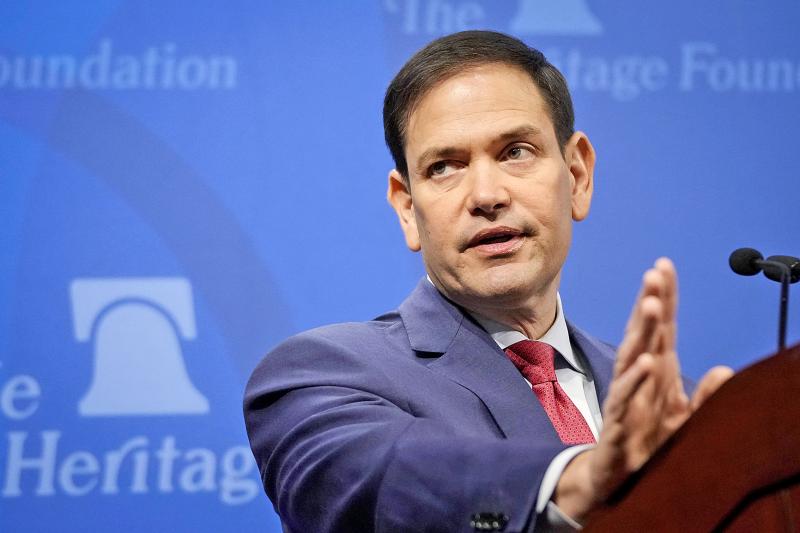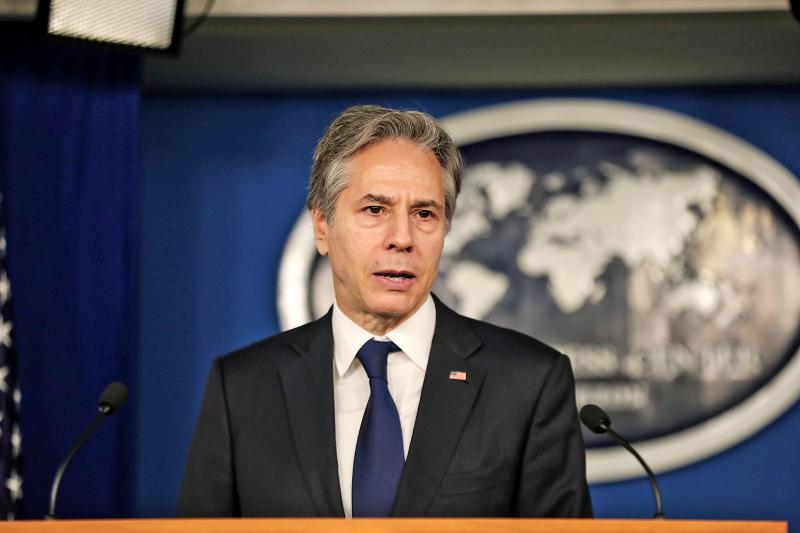US Senator Marco Rubio on Tuesday introduced a bill aimed at fast-tracking the transfer of US weapon systems to Taiwan and improving joint military training to make sure Taiwan can defend itself in case of a Chinese invasion.
In a statement released by his office, Rubio said he proposed the bill because Russia’s invasion of Ukraine would not be the last time an authoritarian regime invades its neighbor.
“An invasion of Taiwan could happen within this decade. Taiwan needs our support,” he said, adding that the bill he introduced “will make [Chinese President] Xi Jinping [習近平] and the Chinese Communist Party think twice before launching a foolish invasion.”

Photo: AFP
Called the Taiwan peace through strength act, the bill requires the US Department of Defense to conduct an annual review of US war plans to defend Taiwan and develop a list of specific capabilities that Taiwan is approved to acquire based on that assessment, the statement said.
The bill requires the department to fast-track foreign military sales (FMS) to Taiwan by requiring the US Department of State to preclear the capabilities identified in the department’s annual review for expedited transfer to Taiwan, it said.
It also asks the department to compel defense contractors to place Taiwan’s FMS orders ahead of those of other countries on the production line, regardless of the order in which the contracts were signed.

Photo: CNA
It further proposes to amend the Taiwan Relations Act to replace “outdated language regarding ‘arms of a defensive character’ with new language that sets an enhanced standard for arms sales to deter conflict with the PLA [People’s Liberation Army].”
The bill also recommends the establishment of a comprehensive joint training program aimed at improving Taiwan’s defense capabilities, among others.
In related news, US Secretary of State Antony Blinken on Tuesday said that Washington is partnering with Taipei to build greater resilience against Beijing’s disinformation efforts.
Asked to comment on the US Department of State’s repeated warnings that China has tried for years to pressure media outlets in Taiwan to not publish articles critical of Beijing, Blinken said that Taiwan is “quite literally on the front lines of the PRC’s [People’s Republic of China’s] hybrid warfare, including disinformation and cyberattacks.”
Such warfare is designed to distort the information environment and democratic processes, he said at a press event at the state department’s Washington Foreign Press Center on World Press Freedom Day.
To counter such attacks, the US has joined with Taiwanese authorities and civil organizations “to support independent, fact-based journalism, to try to build societal resilience to disinformation and other forms of foreign interference,” he said.
Blinken said that US President Joe Biden’s administration has made it clear that free speech is incredibly important at home and around the world.
He reiterated Washington’s deep concern that Beijing has been misusing technology to increase “surveillance, harassment, intimidation, censorship of PRC citizens, of journalists, of activists and others.”
He also accused leaders in Beijing of using the free and open media to spread propaganda and disinformation, and to threaten critics even outside China’s territory.
“We’ve condemned and we’ve taken action against these efforts, and we’ll continue to defend the principles of a free press, an open, secure, reliable and interoperable Internet, and the benefits that flow from it,” he said.

Tropical Storm Gaemi strengthened into a typhoon at 2pm yesterday, and could make landfall in Yilan County tomorrow, the Central Weather Administration (CWA) said yesterday. The agency was scheduled to issue a sea warning at 11:30pm yesterday, and could issue a land warning later today. Gaemi was moving north-northwest at 4kph, carrying maximum sustained winds near its center of up to 118.8kph and gusts of 154.8kph. The circumference is forecast to reach eastern Taiwan tomorrow morning, with the center making landfall in Yilan County later that night before departing from the north coast, CWA weather forecaster Kuan Shin-ping (官欣平) said yesterday. Uncertainty remains and

SEA WARNING LIKELY: The storm, named Gaemi, could become a moderate typhoon on Wednesday or Thursday, with the Taipei City Government preparing for flooding A tropical depression east of the Philippines developed into a tropical storm named Gaemi at 2pm yesterday, and was moving toward eastern Taiwan, the Central Weather Administration (CWA) said. Gaemi could begin to affect Taiwan proper on Tuesday, lasting until Friday, and could develop into a moderate typhoon on Wednesday or Thursday, it said. A sea warning for Gaemi could be issued as early as Tuesday morning, it added. Gaemi, the third tropical storm in the Pacific Ocean this typhoon season, is projected to begin moving northwest today, and be closest to Taiwan on Wednesday or Thursday, the agency said. Today, there would likely

DISRUPTIONS: The high-speed rail is to operate as normal, while several airlines either canceled flights or announced early departures or late arrivals Schools and offices in 15 cities and counties are to be closed today due to Typhoon Gaemi, local governments announced last night. The 15 are: Taipei, New Taipei City, Taoyuan, Tainan, Keelung, Hsinchu and Kaohsiung, as well as Yilan, Hualien, Hsinchu, Miaoli, Chiayi, Pingtung, Penghu and Lienchiang counties. People should brace for torrential rainfall brought by the storm, with its center forecast to make landfall on the east coast between tonight and tomorrow morning, the Central Weather Administration (CWA) said. The agency issued a sea warning for the typhoon at 11:30pm on Monday, followed by a land warning at 11:30am yesterday. As of

CASUALTY: A 70-year-old woman was killed by a falling tree in Kaohsiung as the premier warned all government agencies to remain on high alert for the next 24 hours Schools and offices nationwide are to be closed for a second day today as Typhoon Gaemi crosses over the nation, bringing torrential rain and whipping winds. Gaemi was forecast to make landfall late last night. From Tuesday night, its outer band brought substantial rainfall and strong winds to the nation. As of 6:15pm last night, the typhoon’s center was 20km southeast of Hualien County, Central Weather Administration (CWA) data showed. It was moving at 19kph and had a radius of 250km. As of 3pm yesterday, one woman had died, while 58 people were injured, the Central Emergency Operation Center said. The 70-year-old